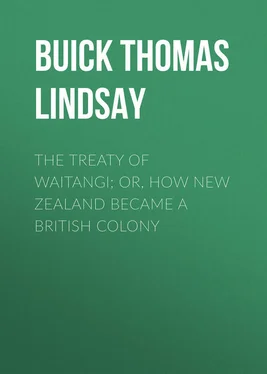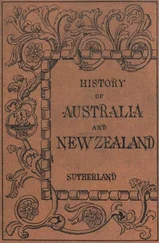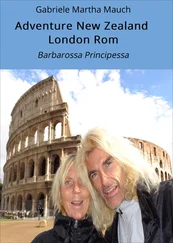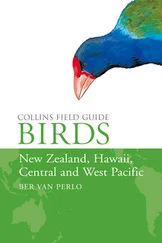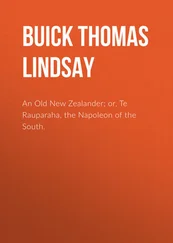Thomas Buick - The Treaty of Waitangi; or, how New Zealand became a British Colony
Здесь есть возможность читать онлайн «Thomas Buick - The Treaty of Waitangi; or, how New Zealand became a British Colony» — ознакомительный отрывок электронной книги совершенно бесплатно, а после прочтения отрывка купить полную версию. В некоторых случаях можно слушать аудио, скачать через торрент в формате fb2 и присутствует краткое содержание. Жанр: foreign_antique, foreign_prose, на английском языке. Описание произведения, (предисловие) а так же отзывы посетителей доступны на портале библиотеки ЛибКат.
- Название:The Treaty of Waitangi; or, how New Zealand became a British Colony
- Автор:
- Жанр:
- Год:неизвестен
- ISBN:нет данных
- Рейтинг книги:5 / 5. Голосов: 1
-
Избранное:Добавить в избранное
- Отзывы:
-
Ваша оценка:
- 100
- 1
- 2
- 3
- 4
- 5
The Treaty of Waitangi; or, how New Zealand became a British Colony: краткое содержание, описание и аннотация
Предлагаем к чтению аннотацию, описание, краткое содержание или предисловие (зависит от того, что написал сам автор книги «The Treaty of Waitangi; or, how New Zealand became a British Colony»). Если вы не нашли необходимую информацию о книге — напишите в комментариях, мы постараемся отыскать её.
The Treaty of Waitangi; or, how New Zealand became a British Colony — читать онлайн ознакомительный отрывок
Ниже представлен текст книги, разбитый по страницам. Система сохранения места последней прочитанной страницы, позволяет с удобством читать онлайн бесплатно книгу «The Treaty of Waitangi; or, how New Zealand became a British Colony», без необходимости каждый раз заново искать на чём Вы остановились. Поставьте закладку, и сможете в любой момент перейти на страницу, на которой закончили чтение.
Интервал:
Закладка:
Shorn of everything which suggested practical power, except the name of British Resident, Mr. Busby soon found himself in no very enviable position. He was ignored by the whites and laughed at by the natives. To add still further to his difficulties he was slow to recognise that the Missionaries in the long years of their labour had naturally acquired more influence with the natives than he could possibly have, and he was reluctant to achieve his object by appearing to play a subordinate part to them. He had been explicitly instructed to seek their hearty co-operation, and take every advantage of the high respect in which they were held by the natives. It was not long, however, before he began to develop ideas of his own and to formulate a policy which he could not enforce, because it was at variance with that of the Missions.
He had also been accredited to the thirteen chiefs who had signed the memorial to the King in the previous year, and had been advised to seek their assistance in arresting those offenders whom he had power to transmit to Sydney for trial. The number of such persons whom he might have apprehended now totalled, we are assured, to several hundreds; but the process was, as Sir Richard Bourke had suggested, so obviously "prolix and inconvenient," that Mr. Busby exercised to the full the measure of discretion given him by the Governor, and left them severely alone. 12 12 Mr. Busby's difficulties in this connection were considerably increased by the fact that when British subjects were accused they frequently sheltered themselves under the American flag, saying, "We are Americans, you have no right to interfere with us." – Captain Fitzroy.
According to Captain Fitzroy, who visited the Bay of Islands during the cruise of H.M.S. Beagle in 1835, he preferred to fold his hands and allow events to shape their own course. "He chose to tell every one who went to him that he had no authority; that he was not even allowed to act as a Magistrate, and that he could do nothing. The consequence was that whenever anything did occur, those who were aggrieved went to the Missionaries. Mr. Busby might have very considerable power, because the Missionaries have such influence over the whole body of natives they could support him. If Mr. Busby wanted a person taken up he had only to express his wish to the Missionaries, and the natives would have done it for them, but he was slow to act in that way. He was sent there in a high character, and was accredited to the Missionaries, and had he communicated with them freely and allowed them to be cognisant of, if not the agents in all that took place, while he remained as the head, and the understanding had been that all that the Missionaries did was done in concert with Mr. Busby, and all that eventuated was from him as the head, his influence would have been far too great for any individuals in that part of the Islands to resist. By dividing the two influences Mr. Busby lost his power of preventing mischief. He remained on tolerably good terms with them, but separated himself in an unnecessary degree from them, and thought he might differ from them sometimes, even to taking a precisely opposite course of conduct to that which they recommended. The consequences were that while the natives retained their opinion of the Missionaries, they found that the Resident was a nonentity, and that he was there to look on and nothing more."
As illustrating the class of difference which sometimes arose between the Resident and the Missionaries, and which must have appreciably hampered the activities of both, Captain Fitzroy stated to the Committee of the House of Lords that when he was at the Bay of Islands in 1835 there was then a serious difference between the real and the nominal head of the community, with respect to the stopping or discouraging the sale of ardent spirits. The Missionaries wanted to carry into effect a regulation similar to one established in the Society Islands, namely, that no spirits should be imported into the country. Mr. Busby would not be a party to such a rule, contending that it was an unnecessary measure; while the Missionaries, on the other hand, were unanimous in declaring it was one of the most useful precautions they could take, but no amount of argument could induce Mr. Busby to co-operate with them. 13 13 "After ardent spirits were introduced in the neighbourhood of Hokianga the Christian natives themselves became so sensible of the evils resulting from the use of them, that under the influence of the Missionaries the chiefs assembled and agreed to certain regulations, the effect of which was to prohibit the introduction and sale of ardent spirits. Those regulations received the sanction of the Governor of New South Wales, and were for a time partially carried into effect. Our Missionaries have transmitted a copy of the resolutions adopted at a meeting of the natives at Hokianga for the formation of a Temperance Society. Those resolutions were signed by fifteen native chiefs. One chief who was present declined for a time, but at length he agreed, and also signed them. Another chief remarked that it would be desirable that wine and porter should also be prohibited, for if they were allowed the English would say when the rum casks came that they were wine and porter, and by that means spirits would continue to be smuggled into the river. The later accounts give us reason to fear that notwithstanding these regulations spirits continued to be introduced there in defiance of the laws made by the native chiefs." – Rev. Dr. Beecham before Committee of House of Lords.
Mr. Busby at all times expressed the most profound respect for the Missionaries and veneration for their labours. He also cheerfully acknowledged that if the British Government expected them to accord their influence to its Representative they must be given a specified share in the government of the country. But when it came to a point of difference, he plainly let it be known that he considered himself possessed of a sounder judgment than they. After detailing to Governor Bourke a discussion in which he claimed to have got the better of the Missionaries, he wrote: "I thought they would naturally conclude in future that it was possible for the conclusions of a single mind, when directed to one object, to be more correct than the collective opinions of many persons whose minds are altogether engrossed with the multitude of details which fill up the attention of men, occupied as they are, leaving neither leisure nor capacity for more enlarged and comprehensive views."
Mr. Busby might have said more in fewer words, but he could scarcely have depreciated the mental powers of the Missionaries in a more delightfully prolix sentence. Skilfully, however, as the sting was sheathed within a cloud of words, the barb came through, with the not unnatural result that he had to confess the Missionaries afterwards neither respected his opinions nor appeared anxious to co-operate with him in what he described as "the furtherance of matters connected with the King's service in this country."
Though severely handicapped by his inability to coordinate his ideas with those of the Missionaries, or to sink his individuality before theirs, it does not follow that Mr. Busby was entirely idle. He lent himself with considerable industry to the task of placing the shipping of the country upon a basis more satisfactory than it had up to that time been. At the date of his arrival there were a number of New Zealand owned craft trading on our coasts, and several vessels were building on the Hokianga River. Sailing as these vessels were under no recognised register, and without the protection of the British ensign, which they were prohibited from hoisting, they were liable to seizure at any time by any enterprising pirate. 14 14 The British Admiralty agreed to respect and protect the New Zealand ships' registers after the National flag had been hoisted.
Equally impossible was it for these owners to register their craft in New Zealand, for there was as yet no acknowledged flag of the nation.
Интервал:
Закладка:
Похожие книги на «The Treaty of Waitangi; or, how New Zealand became a British Colony»
Представляем Вашему вниманию похожие книги на «The Treaty of Waitangi; or, how New Zealand became a British Colony» списком для выбора. Мы отобрали схожую по названию и смыслу литературу в надежде предоставить читателям больше вариантов отыскать новые, интересные, ещё непрочитанные произведения.
Обсуждение, отзывы о книге «The Treaty of Waitangi; or, how New Zealand became a British Colony» и просто собственные мнения читателей. Оставьте ваши комментарии, напишите, что Вы думаете о произведении, его смысле или главных героях. Укажите что конкретно понравилось, а что нет, и почему Вы так считаете.
